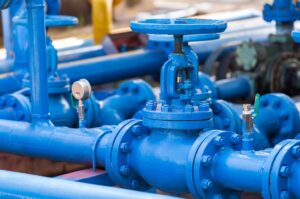Germany’s regulatory office has officially decided not to grant the Nord Stream 2 pipeline a derogation from the EU Gas Directive, a move that could further delay the project and lower its profitability. If new US sanctions don’t stop the plan, its architects may try to use the EU law in a way that would not to interfere with their interests – writes Wojciech Jakóbik, editor in chief at BiznesAlert.pl.
Gas Directive may delay Nord Stream 2
Germany’s regulatory office Bundesnetzagentur announced it decided not to award derogation to Nord Stream 2, a gas pipeline connecting Germany and Russia, from the amended EU Gas Directive. According to the law, gas pipelines from outside of the EU that were not completed before 23 May 2019 need to have an independent operator, independently set tariffs and provide access to third parties. Gazprom, which owns the operator of the NS2 project, tried to argue that investment decisions about the pipeline had been made before 23 May last year, which meant the project had been somehow completed from the point of view of financing. Germany decided the gas pipeline had not been finished, which, by the way, was in line with common sense because a gas pipeline that does not connect point A to B cannot transmit gas, and Nord Stream’s Danish section is still under construction and is waiting for a permit from the Danish Energy Agency. The wait may be long, as the Agency had already delayed the project in the past when it took its time to make a previous decision. However, Russia may question the BnetzA ruling in court, similarly to what Poland’s PGNiG wanted to do if the decision had been in favor of Nord Stream 2. The court case may take place while the gas pipeline is allowed to operate, or not. This remains to be seen.
BnetzA’s decision means Nord Stream 2 AG will have to implement EU regulations with regard to the disputed pipeline. This is a hard nut to crack for Gazprom and a conflict between Russian and EU law. Russia granted Gazprom legal exclusivity over gas exports via gas pipelines, including Nord Stream 2, so it does not offer access to its pipelines to third parties. Additionally, Gazprom owns NS2 AG and is the pipe’s only gas provider, which means it would be responsible for setting tariffs. This goes against ownership unbundling required by the EU law.
Now Gazprom may either sell the pipeline, or hand over its operation to an “independent” company, that would guarantee fair transmission tariffs. Since Nord Stream 2 AG has a full share ownership it is not allowed to be the operator, but it remains to be seen whether this role could be played by a daughter company of the giant from Petersburg, which would hold a minority share. Perhaps the Russian-German company Gascade could become the pipe’s operator. Gascade is a joint venture of Gazprom and BASF that operates gas pipelines in east Germany, including OPAL, which is an onshore extension of Nord Stream, and EUGAL (in construction), an onshore leg of Nord Stream 2.
Probably Russia would also have to change the law to allow other companies access to Nord Stream 2. This is a time-consuming process and perhaps an inadmissible EU interference with the country’s legislation, and thus a significant issue for Moscow’s image. Alternatively, the company could offer access to Nord Stream 2 at the pipe’s starting point in Russia, so that gas buyers could take over responsibility once the fuel enters the Baltic Sea territory. Gazprom is testing trading gas on the SPIMEX mercantile exchange in Petersburg (close to the starting point of Nord Stream 2) and is successful at increasing its sales. Trading Russian gas on the exchange is such an interesting solution that Alexander Lukashenko used it as an argument during his negotiations on lowering gas prices for Belarus.
Not if, but how will the Gas Directive be implemented
It remains to be seen not if, but how Russians will implement the Gas Directive for Nord Stream 2. The European Commission will allow deliveries via the pipe only after the implementation of the law is approved by Bundesnetzagentur. However, before this happens a number of unexpected events may occur. One of them could be an internal conflict within the EC, similar to the one that led to a decision deadlock in March 2017, when directorates-general issued contradictory legal opinions. Even Germany’s Bundesnetzagentur may pursue a hard to expect determination in enforcing the implementation of the Gas Directive for Nord Stream 2.Therefore, a lot of scenarios are on the table and BiznesAlert.pl will as always keep an eye on them. By the way, the sword of Damocles is still hanging over the project as the US may implement new sanctions. American politicians claim they will not allow the construction of the pipe to be finished by the Akademik Cherskiy ship, which is getting ready to work on the Baltic Sea.








